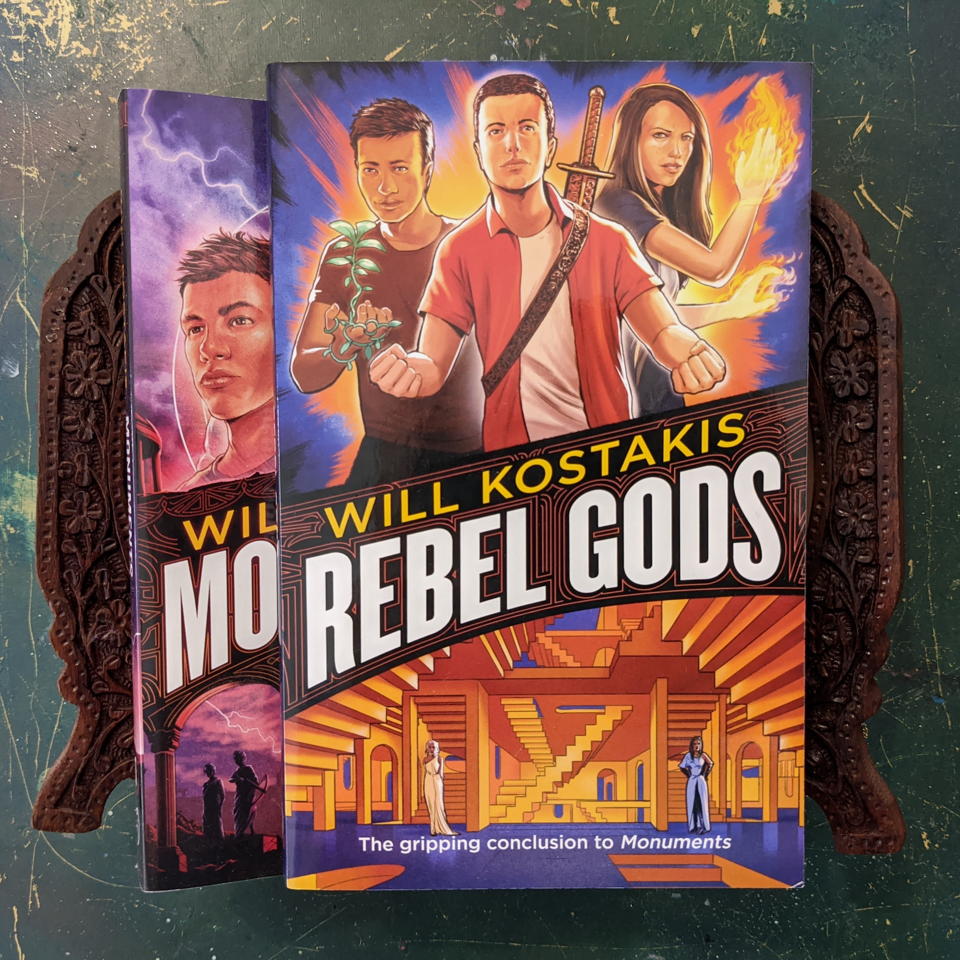Rebel Gods by Will Kostakis (2020). Sydney: Lothian Children’s Books.

General Content Warning for spoilers and shame over not being nice to your mum.
A Kostakis Novel
It was about this time last year I met Will. He was at Brisbane Supanova touring Monuments while I was accompanying a comic friend at the other end of the hall. It took me three attempts to catch him in-person, of course — having never grasped the concept of reading a program. And when I did catch him, it was hard not falling back into that dark, dark state where I once considered myself a ‘dedicated fanboy’.
Bright eyes and big smile, he asked who he should sign Monuments to. And when I gave him my name, he laughed! Told me he recognised it from a review I wrote on Holden Shepard’s Invisible Boys, which convinced him to give it a read. There I made an off-hand comment Will found ‘shady’, and proceeded to ‘bully’ me over because he’s secretly a monster*.
*No Wolframs were harmed in the writing of this article.
The thing I want to impress about Will Kostakis novels is how neatly they fit next to queer novels I grew up with in the 00s. A trope saw three young people who wouldn’t associate with one another otherwise, suddenly orbiting each other because of a secret singularity they now shared. In Alex Sanchez’s Rainbow Boys and Brent Hartinger’s Geography Club, that singularity became a shared queerness with the potential to bloom with solidarity. And in Kostakis’s The Sidekicks, that singularity was Isaac: the deceased friend who brought our three characters together. Because I could feel the echo of that 00s trope, I found their solidarity inherently queer even though two of them were not.
The reason The Sidekicks reads differently to Invisible Boys, however, is because it’s designed to teach young readers about grief rather than to make commentary about the world. Invisible Boys is literary fiction (the place queer texts go to die) successfully marketed as YA. It has a lot to say but nothing to teach. I find The Sidekicks exciting because I believe in utilising YA’s didactic potential: its accessibility means marketing to parents and librarians wouldn’t be difficult, which leaves less gatekeepers between publishers and their intended audience.
That’s a Will Kostakis novel.
Rebel Gods
This tale kicks off in Monuments with young Connor, who’s somewhat defined by his lack of friends. He discovers a secret chamber in the basement of his school, and there he meets the equally wayward Sally as she attempts to wake an ancient god. Together they undermine centuries of work hiding these ancient beings, team up with Locky (the man of Connor’s dreams), and accidentally free a pair of rebel gods bent on dominating mankind. To sum Rebel Gods up quick without too many spoilers: they basically wrap all that up in the most heartbreaking way.
The action feels super appropriate and often adds humour to scenes. These are super average teens after all: they can’t suddenly leap across buildings or master their powers just because there’s rebel gods to kill. It’s a ram them with your car! kind of adventure where the ice melts before you finish the magical frost bridge. It’s something I love about Monuments.
I also love that Kostakis doesn’t follow other YA writers in making his adult characters incompetent, abusive, or exploitative. In Phil Stamper’s The Gravity of Us, as an example, it’s up to sixteen-year-old Cal and his social media account to save NASA where scientists and media experts cannot. And in Christopher Barzak’s Wonders of the Invisible World, we only know parents who refuse input from their children even when it’s a matter of survival. In Monuments, our characters are guided as much by their personal relationships as they are by desire or threat. Their parent’s love for them is integral to their character, and often creates inner conflict for our heroes to overcome.
It warmed me to see Connor and his mum navigate the complexities of their relationship with mutual respect even when they made mistakes. Here’s a single mum doing her best to support a son who, frankly, hasn’t been super great himself. They aren’t going to get it right every time, but at least they’re determined to try. As far as didactic functions go, I thought it was a powerful model for how healthy relationships could work.
The only thing I hate about the series ending so soon is seeing potential for a third book that will never be written. I mean, Connor’s found a way to punch through space and time, and we only get to see him use that once before the series ends. There’s also the network of apprentices who’ve been left out during a pivotal crisis. At any time they could decide they’re more deserving of these powers since their families protected the Monuments for generations. I wanted to see them create conflict for our heroes instead of disappearing into the narrative.
I also wanted to see Connor and Locky figure out graduation dances. I wanted to see more conflict with their immortal futures, and I wanted to see Sally struggle with the mundaneness of a part-time job. All things my inner fanboy doesn’t deserve, but heck if it won’t nag me about it anyway.
Things I love but can only hint at are ‘the magnificent towers’ and how Kostakis constructs them, the hilarity of ‘that PT-inspired evil’, and the sheer audacity of the ending. These you’ll want to discover when you read it yourself. For now, find Kostakis on [Twitter], [Instagram], [Facebook], and [Goodreads] for exciting updates on his recently-released The Greatest Hit.
Leave a comment